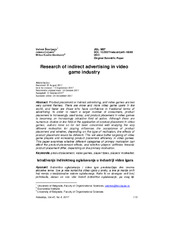Please use this identifier to cite or link to this item:
https://rfos.fon.bg.ac.rs/handle/123456789/1668| Title: | Istraživanje indirektnog oglašavanja u industriji video igara Research of indirect advertising in video game industry |
Authors: | Štavljanin, Velimir Cvijović, Jelena Kostić-Stanković, Milica |
Keywords: | video igre;tipovi igrača;motivacija igrača;indirektno oglašavanje;video games;product placement;players' motivation;player types | Issue Date: | 2017 | Publisher: | Ekonomski institut, Beograd | Abstract: | Indirektno oglašavanje i video igre predstavljaju dve veoma aktuelne teme. Sve je više korisnika video igara u svetu, a sve je manje onih koji veruju u tradicionalne vidove oglašavanja. Kako bi se dosegao veći broj potrošača, danas se sve više koristi indirektno oglašavanje, pa ovaj tip oglašavanja u video igrama postaje sve atraktivnije polje delovanja. Iako postoje mnogobrojne studije u oblasti primene indirektnog oglašavanja u video igrama, do sada se autori nisu bavili istraživanjem kako različita motivacija za igranje utiče na prihvatanje indirektnog oglašavanja i da li će se u zavisnosti od tipa motivacije efekti od indirektnog oglašavanja biti različiti. Ovo će omogućiti bolje ciljanje igrača video igara i povećanje efikasnosti indirektnog oglašavanja u video igrama. U ovom radu se istražuje da li različite kategorije primarne motivacije mogu da utiču na efekte oglašavanja, kao i da li se, u zavisnosti od primarne motivacije, razlikuju stavovi igrača prema indirektnom oglašavanju. Product placement or indirect advertising, and video games are two very current themes. There are more and more video game users in the world, and fewer are those who have confidence in traditional forms of advertising. In order to reach a larger number of consumers, product placement is increasingly used today, and product placement in video games is becoming an increasingly attractive field of action. Although there are numerous studies in the field of the application of product placement in video games, authors have so far not been concerned with studying the way different motivation for playing influences the acceptance of product placement and whether, depending on the type of motivation, the effects of product placement would be different. This will allow better targeting of video game players and increasing product placement efficiency in video games. This paper examines whether different categories of primary motivation can affect the product placement effects, and whether players' attitudes towards product placement differ, depending on the primary motivation. |
URI: | https://rfos.fon.bg.ac.rs/handle/123456789/1668 | ISSN: | 0350-0373 |
| Appears in Collections: | Radovi istraživača / Researchers’ publications |
Show full item record
Page view(s)
8
checked on Dec 28, 2025
Download(s)
2
checked on Dec 28, 2025
Google ScholarTM
Check
Altmetric
This item is licensed under a Creative Commons License


